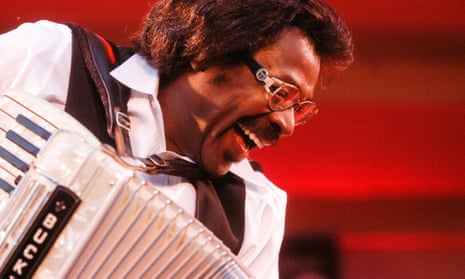The singer, accordionist, keyboard player and bandleader Stanley “Buckwheat” Dural Jr, who has died aged 68 from cancer, was a cultural ambassador for zydeco, the traditional dance and party music of black southern Louisiana. He was the first zydeco musician to be signed by a major record company, his albums were nominated for Grammy awards, his songs were heard on movie soundtracks and in television ads, he played at festivals in the US and Europe, and he opened shows for Eric Clapton and U2.
But this was not the career path he first chose. As a child in his birthplace near Lafayette in Louisiana, he listened without interest when his car mechanic father, Stanley Sr, played his accordion. “I was against zydeco, period,” he told the journalist Todd Mouton. Instead, he admired musicians such as Fats Domino, and began playing piano at the age of nine. Friends nicknamed him “Buckwheat” because with his braids he resembled the character of that name played by the child actor Billie Thomas in a series of popular movie shorts, Our Gang, rerun on television in the 1950s as The Little Rascals.
After high school, Dural became a musician for hire around the Gulf Coast, playing keyboards for Joe Tex, Clarence “Gatemouth” Brown and Barbara Lynn. In 1971 he formed Buckwheat & the Hitchhikers, a 15-piece group doing soul covers. Then, around 1975, he was approached by the singer and accordionist Clifton Chenier to play organ in his band. Chenier was the leading figure in zydeco, and this was not an offer to be turned down lightly, even by a man who cared little for the music. With reservations, Dural signed on – and was immediately impressed by Chenier’s energy. “I had so much fun that night,” he remembered. “We played for four hours and I wasn’t ready to quit.” He was converted to zydeco, and extended his apprenticeship to a couple of years.
He then started playing accordion himself, and in 1979 formed his own zydeco group, Buckwheat Zydeco and the Ils Sont Partis Band. (“Ils sont partis” was a cry familiar to every south Louisiana racegoer – “They’re off!”) They made albums for Blues Unlimited, Black Top and, most importantly, Rounder Records, where Dural’s collaboration with the producer Scott Billington produced the effervescent musical cocktails of the albums Turning Point (1983) and Waitin’ For My Ya Ya (1985).
Dural, said Billington, was “one of the most focused musicians I’d ever met, with both extraordinary musical talent and a strong business sense”. Those assets soon catapulted him to another level of celebrity. An admirer from New York, the journalist Ted Fox, raved about him to Chris Blackwell of Island Records. Dural was signed to a five-album deal, with Fox as producer, and in 1987 the first Island LP, On a Night Like This, introduced zydeco to a new audience. Dural was also heard in a successful movie of that year set in New Orleans, The Big Easy. For the next decade he was the most visible of zydeco musicians, appearing on Letterman and other US television shows, playing for President Clinton during both of his inaugurations and at the closing ceremony of the 1996 Olympics in Atlanta.
For some aficionados, Dural’s music during this period seemed rather like zydeco for tourists. The occasionally bland content of the Island albums suggested, according to one assessor, that “Dural has decided not to mediate creole culture but to mass-market it; if his artistic talent were with a brush, he’d be selling pictures of crawfish painted on driftwood”. But with perspective Dural stands taller than that, and knowledgable commentators on zydeco such as Ben Sandmel and Michael Tisserand regard him as one of the key figures in the musical form.
No doubt zydeco has produced better accordionists; Dural did not plumb the depths of emotion that Chenier could when playing the blues. But he was a gifted and inventive arranger, and the bands he led struck sparks. Most significantly, he refused to be restricted to zydeco’s old creole repertoire – the songs in French, the antique accordion-and-percussion settings. He also reached out to embrace soul music, R&B numbers from Domino or Ray Charles, songs by Bob Dylan, Jimi Hendrix, and – on his last album, Lay Your Burden Down (2009) – Captain Beefheart and Bruce Springsteen. He always wanted to surprise, and would never have wanted someone in his audience to listen to him for an hour and say, “Well, can’t he play something else?”
He is survived by his wife of 40 years, Bernite, by their two sons, Sir Reginald M (who played in his band) and Stanley Paul III, and three daughters, Tomorrow Lynn, April Germain and Stacie.

Comments (…)
Sign in or create your Guardian account to join the discussion